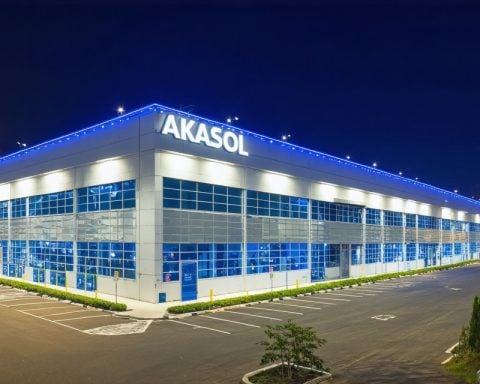- Akasol is permanently closing its facilities in Hazel Park and Warren, Michigan, impacting 188 workers.
- The closures reflect broader industry shifts toward transformation and efficiency in the electric vehicle battery market.
- Communities that depended on these industrial centers are now facing uncertainty and must adapt to new economic conditions.
- The human impact of these closures highlights the ongoing challenge of balancing technological progress with its effects on workers’ lives.
- The situation underscores the importance of resilience and adaptability in the face of industry changes.
- This development serves as a reminder of the interconnectedness of global innovation and its local impacts.
The hum of machinery will soon fall silent in two Michigan towns. Come April, residents of Hazel Park and Warren will no longer hear the rhythmic clatter of production from Akasol’s facilities. The company, a once-vibrant player in the electric vehicle battery market, intends to shutter these sites permanently, a decision that means the abrupt end of employment for 188 dedicated workers.
Ripple effects have spread through communities that have for years relied on the steady work these industrial centers provided. The closure not only marks a significant shift for the workforce but leaves families in a swirl of uncertainty, grappling with the question of where to turn next.
Akasol, once a beacon of innovation and sustainability, now leaves a void, a quiet testimony to the ever-shifting sands of industry. The factory floors, soon to be empty, serve as a stark reminder of an industry’s relentless pace toward transformation and efficiency. As production lines halt, the echo of progress grows faint, urging affected employees to reevaluate career paths and adapt to a new reality.
While the decision is steeped in economic reasoning, the human impact looms large, a bittersweet narrative of progress and its cost. Within this tale lies a crucial lesson about the delicate balance between technology’s march forward and the tangible lives it touches.
As the workforce braces for change, the call for resilience and adaptation rings louder. The broader message transcends borders: in our interconnected world, innovation often asks much of its harbingers. It’s a stark reminder of the need for communities and industries to remain agile, ensuring that as one chapter closes, another begins.
The Silent Shift: How Akasol’s Closure in Michigan Signals Big Changes
How-To Steps & Life Hacks for Affected Workers
1. Skill Assessment and Upskilling: Identify transferable skills and consider new training opportunities. Platforms like Coursera and LinkedIn Learning offer courses that can provide certifications in new areas.
2. Job Search Strategy: Update your resume and leverage professional networks like LinkedIn. Attend job fairs and recruitment events, which are often good places to meet potential employers.
3. Career Pivot: Consider diversifying into related fields such as renewable energy or technology sectors where similar skills might be needed.
4. Financial Planning: Assess your financial situation and create a budget plan to manage expenses during this transition period. Consult financial advisors if needed.
Real-World Use Cases
– Energy Sector Transition: Communities previously reliant on traditional manufacturing are now exploring opportunities in renewable energy production and technological innovation.
– Urban Development Projects: Local governments may repurpose industrial spaces for community development projects, transforming former factories into innovation hubs or community centers.
Market Forecasts & Industry Trends
– EV Battery Market Growth: Despite Akasol’s closure, the electric vehicle (EV) battery market is projected to grow significantly. According to Allied Market Research, the market is estimated to reach $84 billion by 2027.
– Global Shifts: Manufacturers are increasingly looking towards regions with favorable economic conditions and renewable energy policies.
Reviews & Comparisons
Akasol faced tough competition from larger entities such as LG Chem and Panasonic, which have established economies of scale and extensive R&D capabilities. Comparisons often point to:
– Price Points: Larger competitors often offer competitive pricing due to higher production capacities.
– Technological Innovations: Rivals invest heavily in innovation, leading to more advanced battery solutions.
Controversies & Limitations
– Economic Impact on Communities: The sudden closure highlights the vulnerability of local economies dependent on single industries.
– Environmental Concerns: Questions arise around environmental cleanup and sustainability practices post-closure.
Features, Specs & Pricing of Batteries
While Akasol’s batteries were known for their high energy density and fast charging capabilities, competitors are consistently advancing in terms of:
– Charge Cycles: Many now offer batteries that can handle thousands of charge cycles.
– Energy Capacity: Innovations aim to increase energy capacity while reducing costs and production time.
Security & Sustainability
– Cybersecurity: With growing integration of smart battery management systems, security remains a critical focus.
– Sustainability Initiatives: Industry leaders now prioritize sustainable materials and recycling programs to reduce environmental footprint.
Insights & Predictions
– Infrastructure Investments: Expect increased investments in manufacturing infrastructure within regions that offer sustainable and fiscal incentives.
– Policy Shifts: Government policies will likely focus more on sustainable practices and green energy incentives to foster industry resilience.
Pros & Cons Overview
Pros:
– Opportunity for diversification and innovation in new sectors.
– Potential for redevelopment into tech or community centers.
Cons:
– Economic strain on workers and local businesses.
– Loss of industry-specific skill sets without retraining efforts.
Actionable Recommendations
– Networking: Engage with professional groups and former colleagues. This can lead to job leads and emotional support.
– Community Engagement: Participate in town meetings and planning sessions to stay informed on local developments and redevelopment projects.
– Explore New Roles: Be open to roles in burgeoning tech industries or renewable energy sectors that match your skill sets.
For more resources on career transitions and skill development, visit LinkedIn and Coursera.



















